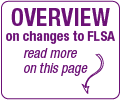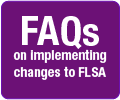The FLSA is a federal law originally enacted in 1938. Under the authority provided by the FLSA, the U.S. Department of Labor sets requirements like the minimum wage, overtime pay, recordkeeping, and standards for employing young people. For more information, visit the Department of Labor's webpage titled Compliance Assistance - Wages and the Fair Labor Standards Act (FLSA).
How does the FLSA affect the UM System?
The university complies with the provisions of the FLSA applicable to public employers and educational institutions. In an effort to assure compliance with the FLSA, the university has established a number of policies as part of the UM System HR Policy Manual, including:
- HR-106: Reporting Hours Worked
- HR-202: FLSA Status
- HR-205: Position Classification and Compensation
- HR-211: Overtime
- HR-212: Standby
- HR-215: Compensatory Time
- HR-503: Rest Periods
Non-exempt (hourly) employees are covered by the FLSA with regard to overtime, minimum wage, equal pay, recordkeeping, and child labor provisions. These same provisions also apply to exempt (salaried) employees except tenets regarding overtime, minimum wage, suspensions, partial-day pay withholdings, and recordkeeping. For example, the FLSA sets a 40-hour workweek as the standard workweek and requires the university to pay at least 1.5 times a non-exempt (hourly) employee's regular pay for overtime hours. Exempt (salaried) employees are not covered under the same requirement.
Reviewed 2021-03-19

